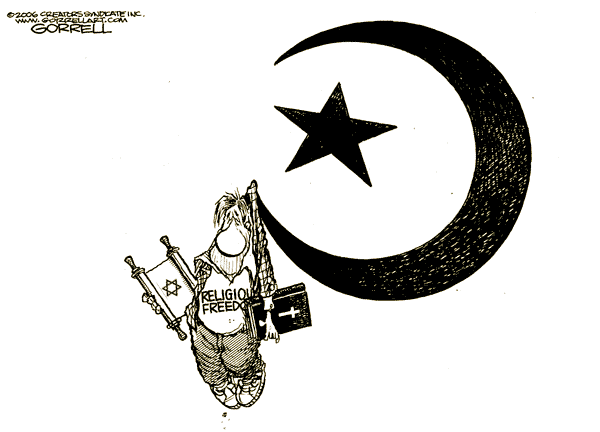
Secretary of State Rex Tillerson highlighted abuses committed by the Islamic State group and Iran as he released Tuesday a new survey of religious rights and freedoms around the world.
The first global report on the status of religious freedoms issued under President Donald Trump is critical of U.S. adversaries and allies alike. Tillerson called out some important partners, such as Saudi Arabia, Turkey, Bahrain and Pakistan, in brief remarks introducing the annual report, which has been mandated by Congress since 1998.
He devoted the most attention to the Islamic State, however, accusing the group of targeted, religiously motivated atrocities against Christians and minority sects. The Obama administration had previously accused the Islamic State of genocide, and Tillerson endorsed that position Tuesday.
"ISIS has and continues to target members of multiple religions and ethnicities for rape, kidnapping, enslavement and death," Tillerson said, using one acronym for the group that holds territory in Syria and Iraq. "ISIS is clearly responsible for genocide against Yazidis, Christians and Shia Muslims," as well as ethnic cleansing.
"The protection of these groups and others who are targets of violent extremism remains a human rights priority for the Trump administration," he added.
Rep. Christopher Smith, R-N.J., a longtime advocate for U.S. action on religious persecution overseas, welcomed the focus on the Islamic State.
"I applaud Rex Tillerson for being so clear and unambiguous about ISIS," Smith said, adding that he had been frustrated at how long it took the Obama administration to brand the group's actions as genocide.
Criticizing Iran, Tillerson pointed to persecution of religious minorities and said that country had carried out executions last year under "vague apostasy laws."
The new report covers 2016, prior to the Trump presidency, but conclusions and decisions about what to highlight were reached under the current administration.
"Religious persecution and intolerance remains far too prevalent. Almost 80 percent of the global population live with restrictions on or hostilities to limit their freedom of religion," Tillerson said. "Where religious freedom is not protected, we know that instability, human rights abuses, and violent extremism have a greater opportunity to take root."
Human rights groups and some political conservatives were waiting for the report, hoping it would provide clues to the new administration's priorities.
The survey is of particular interest to evangelical Christians, who were an important part of Trump's political base. Exit polls in November showed Trump defeating Democratic nominee Hillary Clinton 80 percent to 16 percent among white evangelical Christians, and he has been eager to please this key part of his base. He signed an executive order in May aimed at allowing churches to engage in more political activity and a month later told the Faith and Freedom Coalition, "it is time to put a stop to the attacks on religion."
But the report also comes under an administration with an "America First" mandate that has sought to temporarily ban travel from several Muslim-majority nations and temporarily restrict U.S. acceptance of refugees, many of whom claim to be fleeing religious persecution at home.
The report singles out Saudi Arabia, the first foreign country Trump visited as president, as a country of "special concern" for its religious restrictions. The designation can be a first step to U.S. sanctions, although past administrations have waived that for Saudi Arabia, a key partner in counterterrorism.
The report has been a regular irritant to Saudi Arabia and to other major countries, like Russia and China, where Trump has sought new footing.
The current report was released without much fanfare and without lengthy thematic analyses and personal anecdotes about victims of religious persecution that have marked previous annual surveys.
On China, Tillerson said the report documents how China "imprisons thousands for practicing their religious beliefs."
The report notes that China has been labeled a "country of particular concern" under the law that established the State Department office responsible for the report.
Tillerson did not mention Russia in his remarks at the State Department. The report details alleged persecution against Jews and others in Russia. Russia is not singled out for special concern based on the 2016 findings.
Tillerson noted that Kansas Gov. Sam Brownback, a Republican, has been selected as the next head of that office, which carries the title of ambassador-at-large.
Brownback's selection eased concerns that the position might be on Tillerson's chopping block. Tillerson has said he wants to reduce the overall size of the State Department and has targeted various special representatives and advisers with overlapping authorities.
Shaun Casey, who until January was the State Department's special representative for religion and global affairs and headed an office of 30 people, said the diplomatic effort to promote religious freedom has been undermined by Trump's other actions.
"When he went to Riyadh and told the Saudis, 'We're not going to tell you how to run your country,' that means, 'We're not going to hector you about religious freedom problem,' " said Casey, who now heads the Berkley Center for religion at Georgetown University. "If you're going to ban a specific religious group," from entry into the United States, "that doesn't comport with international norms for religious freedom."
The U.S. government also has an ambassador and a separate commission for religious freedom. Casey called the overlapping branches duplicative, inefficient and often ineffective.


 Contact The Editor
Contact The Editor
 Articles By This Author
Articles By This Author